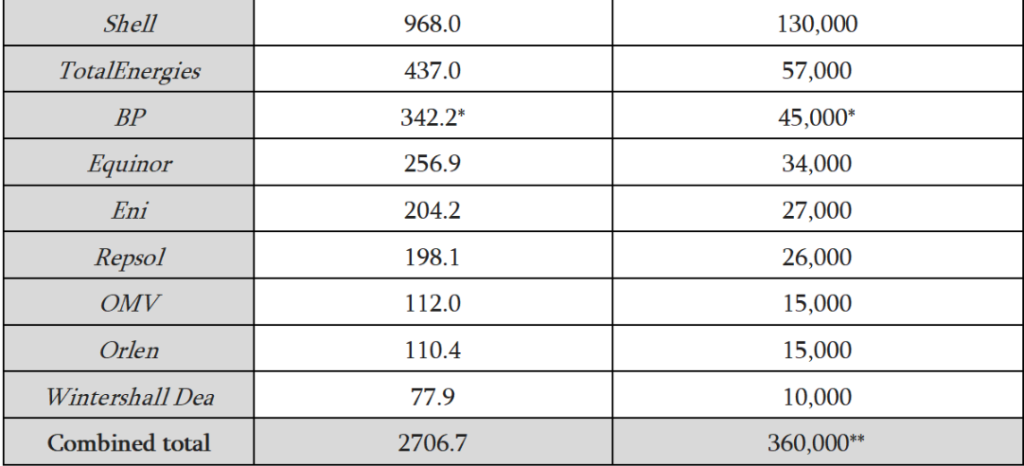Connect with us
Publié
il y'a 8 moisle
Par
Team Afriveille
DUBAI, UAE, December 5, 2023 -/African Media Agency (AMA)/- An estimated 360,000 people could die prematurely before the end of the century because of global heating caused by the 2022 greenhouse gas emissions of nine major European oil and gas companies alone, according to a Greenpeace Netherlands study.[1]
Released today at COP28, the study analyses the self-reported 2022 greenhouse gas emissions of nine major European oil and gas companies: Shell, TotalEnergies, BP, Equinor, Eni, Repsol, OMV, Orlen, and Wintershall Dea. Using the Mortality Cost of Carbon method developed by US researcher R. Daniel Bressler, it estimates that these companies could collectively cause an estimated 360,000 temperature-related premature deaths before the end of the century with their emissions of 2.7 billion metric tons of CO2 from 2022 alone.[2]
Panellist and climate justice activist Vanessa Nakate said: “Fossil fuels are key to environmental destruction, especially for people in the global south. It’s no secret that burning more oil and gas worsens climate breakdown – and right now, they are already harming people’s lives in Uganda, where I’m from, in communities across Africa, and all over the world. This is a matter of climate justice. We need wealthier countries that are most responsible for the climate crisis to stop new fossil fuel projects, invest in clean energy – and help global south nations to do the same.”
Lisa Göldner from Greenpeace’s Fossil Free Revolution campaign, said: “Are fossil fuel companies getting away with murder? Just one year of emissions will create deadly ripples until the end of the century. So, if the fossil fuel industry continues extracting and burning fossil fuels at today’s scale, millions of people all over the world could die prematurely. Phasing out fossil fuels is a matter of life and death, so governments need to act now to ban new fossil fuel projects and force fossil fuel companies to rapidly cut their emissions.”[3]
According to the report, the estimates are likely extremely conservative for five reasons: they only consider excess deaths caused directly by extreme temperatures and don’t assess other climate impacts like more frequent and more extreme flooding, drought, wildfires or storms or infectious disease; they don’t take into account deaths caused by air pollution resulting from burning fossil fuels, or other hazards that result from the production and use of fossil fuels; the companies’ self-reported carbon emissions could be lower than estimates applying other carbon accounting approaches; the study uses a conservative future greenhouse gas emissions scenario; and this estimate only looks at the year 2022, meaning these excess deaths will multiply year by year if fossil fuel emissions are not drastically cut. For these reasons, the true number of premature deaths attributable to the greenhouse gas emissions of the nine oil and gas companies could be larger.
The study, called ‘Today’s emissions, tomorrow’s deaths: How Europe’s major oil and gas companies are putting lives at risk’, is being discussed at a COP28 press conference today (Tuesday 5 December).[4]
Greenpeace is calling on world leaders at COP28 to agree to a swift and fair phase-out of coal, oil and gas, ban all new fossil fuel extraction, and to increase taxes on fossil fuel companies to pay for climate finance and loss and damage, with developed countries who have historic responsibility for emissions leading the way. In 2022, these nine companies reportedly made enormous profits of a combined $163.07 billion. Meanwhile, developing countries are facing climate loss and damage costs of around $400bn by 2030.[5][6]
Independent legal experts in Europe consulted by Greenpeace Netherlands have said that there could be legal basis to prosecute fossil fuel companies for endangering both human life and the environment under their respective national criminal laws, but that the criminal justice systems have been historically under-used for this purpose.[7] Greenpeace Netherlands is calling for laws to be further tested through strategic litigation as a way to address the existential threat of the climate crisis and advocate for impacted communities.
Notes to editors:
[1] Read the full study “Today’s emissions, tomorrow’s deaths: How Europe’s major oil and gas companies are putting lives at risk”.
[2] About the Mortality Cost of Carbon method: The Mortality Cost of Carbon was developed by US researcher R. Daniel Bressler to estimate the number of expected temperature-related excess deaths which will take place globally until the year 2100, caused by present day carbon emissions.


Instead of reporting scope 3 category 11 emissions, BP introduces the category “emissions from carbon of own upstream production” in their reports which only covers part of the emissions that the other five companies report under scope 3 category 11.
**This is the sum of cumulative temperature-related excess deaths by 2100 projected using emissions equivalent to those from each company, rounded to 2 significant figures.
[3] Lisa Göldner is a campaigner from Greenpeace Germany.
[4] The study is being discussed in a press conference at COP28 on Tuesday 5 December. It is being led by panellists Greenpeace Germany campaigner Lisa Göldner and Ugandan climate justice activist Vanessa Nakate.
[5] Oil & gas companies 2022’s self-reported profits:
● BP: $28 billion
● TotalEnergies: $36.2 billion
● Repsol: $4.54 billion
● Equinor: $28.7billion
● Shell: $40 billion (“adjusted earnings”)
● Eni: $14.12 billion
● Wintershall Dea: $1.01 billion (€928 million)
● OMV: $5.6 billion (€5.17 billion)
● Orlen: $4.9 billion (€4.54bn approx)
– Total = $163.07 billion
[6] Submission on the Strategic Workstream on Loss and Damage Finance
[7] Read Greenpeace Netherlands’ response which elaborates on the concept of “climate homicide” based on the analysis of criminal lawyers from the UK, Italy, France, Netherlands and Czechia. According to the analysis, at this time, the most relevant legal avenues explored are:
● Under Czech law, reckless endangerment of human life, and negligent homicide;
● Under Dutch law, the endangerment of public health or the life of another;
● Under UK law, corporate manslaughter;
● Under Italian law, death or injury as a consequence of environmental pollution;
● Under French law, involuntary manslaughter and bodily harm, and refraining from fighting a disaster is likely to create a danger for people’s safety.
Distributed by African Media Agency (AMA) on behalf of Greenpeace.
Contacts
For more information, contact Jasmine Watkiss, International Media Coordinator, Greenpeace UK: +44 7796 947448, jasmine.watkiss@greenpeace.org. For technical questions about the Mortality Cost of Carbon methodology, R. Daniel Bressler is available for a limited number of interviews.
Please contact Jasmine to be put in touch.
Greenpeace International Press Desk: pressdesk.int@greenpeace.org, +31 (0) 20 718 2470 (available 24 hours). For the latest international releases follow us on Twitter @greenpeacepress
The post Getting away with murder?’: European Oil and Gas majors’ 2022 emissions alone could cause at least 360,000 temperature-related premature deaths before 2100 appeared first on African Media Agency.




You must be logged in to post a comment Login